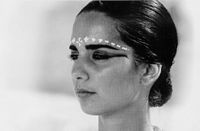
|
 |
Esther
|
ISRAEL,
UK / 1985 / Hebrew / Color/ 35mm (1:1.66) / 97 min
Director, Producer: Amos Gitai
Screenplay: Amos
Gitai, Stephane Levine
Photography: Henri Alekan, Nurith Aviv
Editor: Sheherazade Saadi
Production Design: Richard Ingersoll
Cast: Simona Benyamini, Mohammed Bakri, Juliano Merr
Production Company: AGAV FILMS
37 Rashi Street, Tel Aviv 63265, ISRAEL
Phone / Fax: 972-3-5255971
Source: Israel Film Archive

|
|
Amos
Gitai

Born 1950 in Haifa, Israel. Studied architecture from 1971 at the
Israel Institute of Technology, around when he started to make experimental
8mm films. In 1977 he began making documentaries for Israeli television.
After Field Diary (1982), shot shortly after the Lebanon war,
met with much hostility in his country, Gitai moved to Paris where
he would live for 10 years. His documentary films include Labor
for Sale (1984) which concerns immigrant laborers in South-East
Asia, Brand New Day (1987) which follows the Eurythmics' Revenge
Tour in Japan, and A House in Jerusalem (1998), which focuses
on the complex history of one house in Jerusalem as a microcosm of
the complex relations between Jews and Palestinians. In 1985 Gitai
directed his first narrative feature Esther, which was followed by
Berlin-Jerusalem (1989) and then Golem-The Spirit of the Exile
(1991) to form his ' ' Trilogy of the exile.'' In 1993 Gitai returned
to Israel. His latest fiction feature film Kaddosh (1999) was
selected for competition at this year's Cannes Film Festival, and
will be screened at the Tokyo International Film Festival 1999. |
Amos Gitai's first work of fiction after leaving Israel and moving
to Paris is a filmed version of the "Book of Esther" from
the Old Testament. However, its more of a cinematic interpretation
than a film adaptation. The Biblical text is spoken, for instance,
in modern Hebrew and the film is visualized as an immense tableau-vivant
inspired by Persian miniatures. Master French cinematographer Henri
Alekan is responsible for the stunning images. Religiously speaking,
visualizing biblical text is forbidden as idolization. The principal
locations are in Israel near Haifa: Wadi Salib, a dense Arab quarter
until Israeli independence, then a Moroccan Jewish settlement in the
50s before being destroyed by a riot; and Akko, a port town where
the Crusaders of the middle-ages first landed in Palestine and prospered
under the Ottoman regime. So the biblical story of Jewish exiles is
told by Jewish and Arab actors at a crossroads of three civilizations
that each revere The Old Testament (Jewish, Christian, and
Islamic), and where the contradictions of 20th century Diaspora and
immigrations have in the past exploded into violent conflict.
Juror's
Statement
Documentary is like an archaeological digging. You have to dig, and
layer by layer, you see the parameters of the subject. When I made
Pineapples ("Ananas," 1984), I looked at the label of
a can of pineapples, and it said "Produced in the Philippines.
Packaged in Honolulu. Distributed in San Francisco," and at one
corner, it said "Printed in Japan." I sent this label to
my producer and said, "This is the screenplay, now all you have
to do is to give us five plane tickets, and I'll tell you something
about multinational corporations, the third world, and the relations
between countries at this end of the twentieth century."
Filmmakers are doing much to exoticize their own cultures. They portray
them only with local cuisine and traditional dress. But after all,
in Tokyo, in Tel Aviv, Amman, Cairo or New York, people dress in similar
ways, and watch the same TV programs (unfortunately!) The role of
the cinema becomes the counter-weight to the media: to give us a more
precise sense of the personalities of societies, not the caricatured
images that the media gives us. I am always touched by filmmakers
who have the courage to be critical about their own societies. It's
one of the most complex things one can do and it's sometimes even
painful. Being critical doesn't mean you want to erase it or ignore
the necessity of continuation. Every culture, in each generation,
needs to re-invent and re-evaluate itself.
A filmmaker's ethics are very delicate, and especially so in documentary
because the people you film are not hired as actors. In a way, you
enter into an unwritten contract between yourself and the people you
film. Sometimes you want to ask questions, but since we are shy people
it's not polite to ask. If you have a camera it's a way to legitimize
asking! Unfortunately, documentary today is too much dominated by
reportage style, with voice-overs that tell you everything that you
have to know.
Cinema is a medium of communicating and you can disturb or stir-up
people with it. It's the medium of the twentieth century, and we really
have to be careful not to diminish it to just so much hamburger. It's
a great gift that is given to us fimmakers so we have to preserve
it.
|
  |
|
before  next next
|
COPYRIGHT:Yamagata International Documentary Film Festival Organizing Committee |